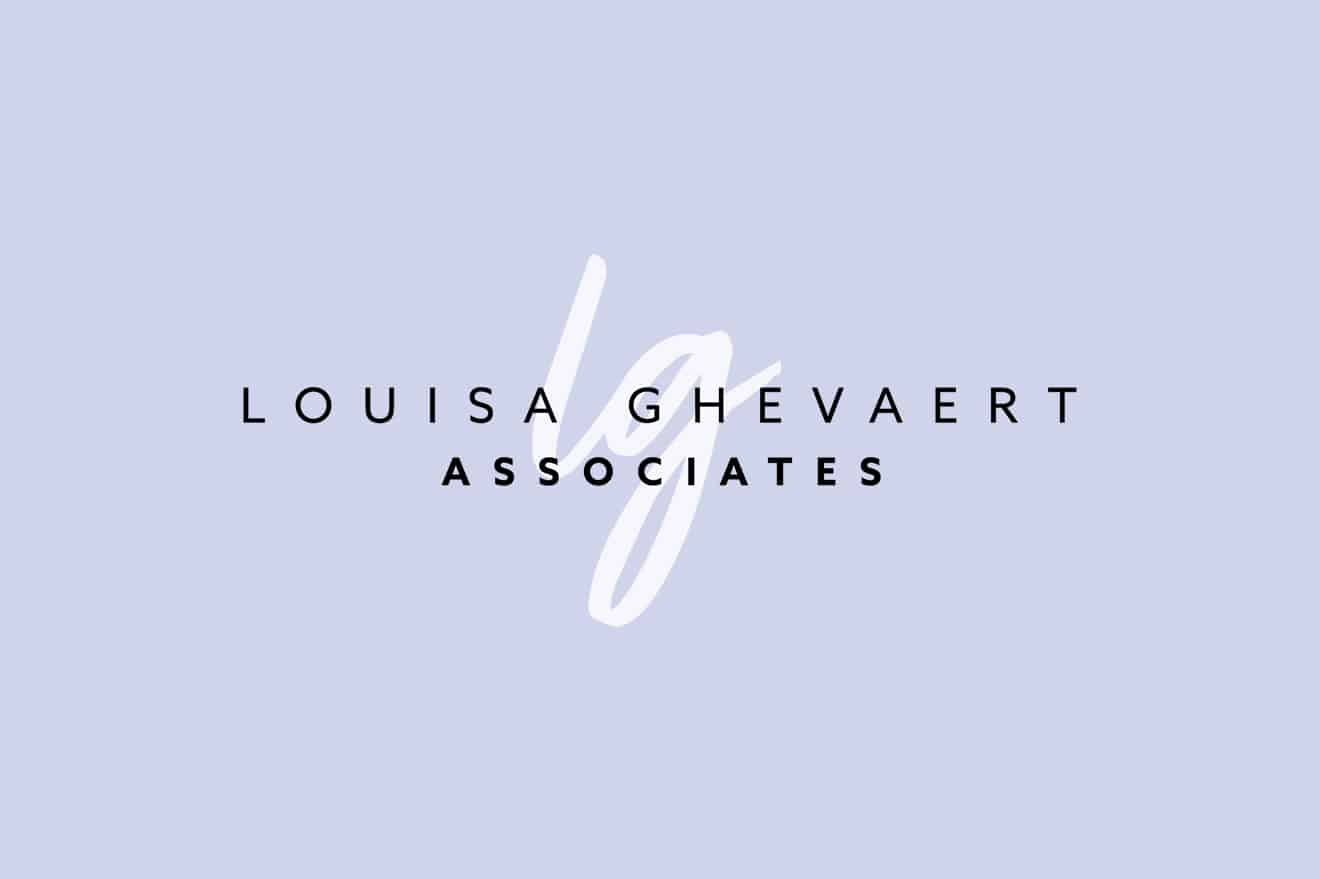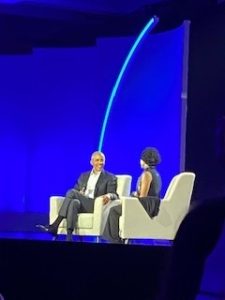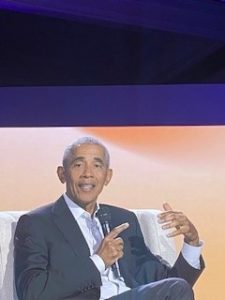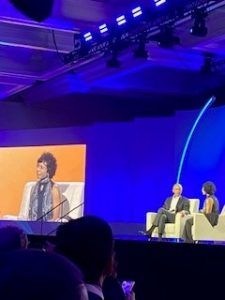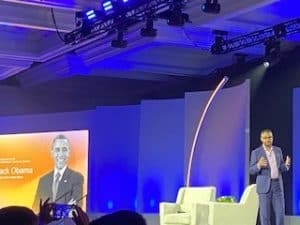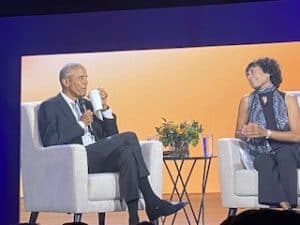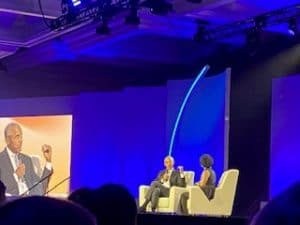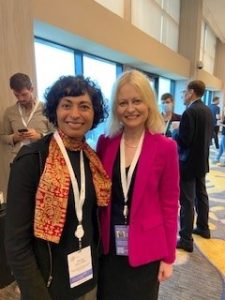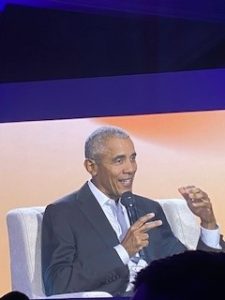4 October 2022
Louisa Ghevaert was privileged to attend a spotlight speech by former US President Barack Obama at Illumina’s inaugural in-person Genomics Forum in San Diego on 28 September 2022. Building on his healthcare and precision medicine initiatives during his terms in presidential office, President Obama addressed the continued importance and ongoing need for equitable, accessible, affordable and better healthcare to improve the human condition.
Precision Medicine
Former President Barack Obama has been a long term proponent for affordable healthcare, precision medicine and genomics. In his 2015 State of the Union address, President Obama announced the launch of the Precision Medicine Initiative, recognising that advances in mapping out the human genome opened up new possibilities to identify diseases and target them through individualised treatments to reduce costs and provide better healthcare.
The Precision Medicine Initiative aimed to revolutionize improvements to human health and treatment of disease by moving from a ‘one-size-fits-all’ approach to one that takes into account individual differences in people’s genes, lifestyles and environments. It set out a vision whereby the future of precision medicine would enable healthcare providers to tailor treatment and prevention strategies to people’s individual characteristics, including their genome sequence, microbiome composition (the collection of microorganisms in or on the body), health history, lifestyle, and diet. It also sought to work towards the development of individualized care through research, technology and policies that empower patients, scientists, medics and providers to work together to make the healthcare ecosystem more effective. In doing so, it aimed to create new architecture and build new foundations to revolutionize medicine in areas like cancer, alzheimer’s and other genetic diseases. Furthermore, the Precision Medicine Initiative set out a series of guiding principles for precision medicine activities including: governance, transparency, participant empowerment, respect for participant preferences, data sharing, access and use, data quality and integrity.
Building on the Precision Medicine Initiative, President Obama explained at a White House Precision Medicine Initiative Summit on 25 February 2016 that what were labelled as healthcare systems were more often than not a disease care system in which the patient was passive, waited until they got sick and then relied on experts to find a solution. In contrast, one of the promises of precision medicine was not just to identify and give researchers and medical practitioners tools to help cure people but also to empower individuals to monitor and take a more active role in their own health. He explained that precision medicine, done well, would give information and data to individuals so that they could stay healthy for long periods of time. This would be good for those individuals as well as society in that it would reduce healthcare costs and prevent diseases from manifesting themselves in the first place.
The Precision Medicine Initiative worked with Federal government agencies in an “all of government” approach to implementation including the Department of Health and Human Services, the Department of Veteran Affairs and the Department of Defense. It also sought engagement from patient groups, bioethicists, privacy and civil liberties advocates and technologists to address legal and technical issues related to the privacy and security of data in the context of Precision Medicine.
Illumina Genomics Forum 2022
At Illumina’s inaugural Genomics Forum 2022, Former President Obama explained that his desire for better healthcare was influenced by the fact that his own mother died of an aggressive cancer aged just 53. He described how limitations with the healthcare system resulted in a diagnosis that came too late and that had there been a better system there could have been better prevention. He went on to explain that through his political work he heard of people who were unable to afford healthcare and effective medicines, losing homes and rationing medications in the process. As a result, he fought hard to get the Affordable Care Act 2010 passed to reduce uninsured healthcare, produce better outcomes and healthcare and save money.
Building on his healthcare and precision medicine initiatives, President Obama explained that we are still not maximising data. He explained that data is still in silos and that the way financial systems are structured results in issues with incentives to share data. He explained that we need to achieve bigger data sets to gain a better health understanding. He went on to say that progress has been slower than he had hoped for due to a creaky system, which accounts for one sixth of the US economy, reiterating that this has evolved as a disease care system and not a disease prevention system. He added that if he were to design a healthcare system from scratch then a non-employer based single pay approach would be better. This would result in a unified system, which in turn makes it easier to reform under one roof.
Asked about his sources of strength, former President Obama explained that the Presidency is a lonely job. That said, his wife Michelle often reminded him that he had volunteered for the position. He went on to say that in any challenging endeavour to create success, it is the ability to create a team and supporters that makes the difference. He explained that part of dealing with the burdens of decision-making under pressure is the need to become mission focussed and to build a team which is not obsessed with hierarchy. He explained that he worked out that it was often the juniors in the room who were the ones preparing and who could provide a valuable voice and perspective. He went on to say that it was about building a culture where everyone has a contribution and that truth does not follow rank. He added that in building the team, it created an attitude of ‘being in it all together’ and this created a sense of ownership and a feeling of confidence that you have made a good process for decision-making.
Asked about leadership, former President Obama explained that it is figuring out how to unleash other people’s powers, talents and gifts. He went on to say that part of the task now is to figure out how to unleash the power of genomics. In doing so, how do we build up big databases to empower researchers to move faster and identify effective drugs more quickly? How do we screen people early for disease predispositions and make changes to their behaviour?
President Obama went on to say that leadership was also not worrying about whether he was the smartest person in the room and instead asking lots of questions of other people, rather than trying to be the font of all knowledge. He explained that he is big on collecting data, getting all the facts and information and building a team with deep knowledge and breadth of angle. In doing so, he explained that it is important to create a diverse team with different perspectives, talents and gifts and that companies with a proportion of women on their boards perform better.
When asked what piece of advice he would give himself twenty years ago, President Obama explained that he always felt as if you have to go through a certain process to really know something deeply. He explained that by the time he left the Presidency after his second term, he was really good. It was not more knowledge and facts and he was a serious student of policy and decision-making. He explained that the reason he was a better President was because he had been through just about everything and he was not afraid of anything. He sloughed off fear because had had already made mistakes and once he had been through that and survived it became empowering. In short, you learn by doing it.
When asked about his call for us all to be our most bold and audacious selves, President Obama explained that a lot of worthwhile things can be accomplished in our lifetimes. He explained that when he was born in 1961, large swathes of the US were still segregated with white only drinking areas and separate areas on buses. It was not until he was aged six that the Supreme Court ruled that it was unconstitutional for his parents (an inter-racial couple) not to be able to marry. He explained that more recently, there has been incredible progress around sexual orientation and the LGBTQ community which was unimaginable twenty years ago. He went on to say that we have witnessed history change and much of this is good and we should feel hopeful.
President Obama concluded that we must all keep showing up and that things will get better. As tough as things seem in the news, in the aggregate humanity has never been healthier or better educated. Our institutions are creaky, but they can change and we have to pass on to the next generation the importance of showing up and doing the work so progress will be made.
For more information about genomic, fertility, family and wider law, policy and governance contact Louisa Ghevaert by email louisa@louisaghevaertassociates.co.uk or by telephone +44 (0)20 7965 8399.

